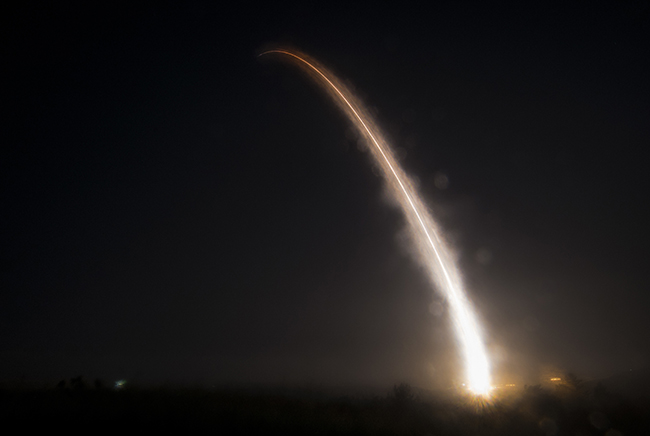
An unarmed Minuteman III intercontinental ballistic missile launches during an operational test on May 1, 2019, at Vandenberg AFB, Calif. Air Force photo by A1C Aubree Milk.
The Air Force is moving ahead with its program to replace Minuteman III intercontinental ballistic missiles amid congressional debate about future nuclear weapons.
The service on July 16 issued an industry solicitation that will ultimately help choose which company builds the Ground-Based Strategic Deterrent, the new generation of ICBMs, according to a release. Boeing and Northrop Grumman have been refining and prototyping their missile designs under government contracts for the past two years, and the Air Force next year will pick a single contractor to provide more than 600 weapons.
The Air Force is asking for cybersecure, easily upgradeable, reliable weapons that can meet the challenges of 21st-century nuclear deterrence, and officials tout the program as a model for smart, flexible procurement.
The upcoming engineering and manufacturing development contract is expected to be worth $25 billion, according to a June 17 contracting document. Total development cost stands at nearly $22 billion, the service said in its 2020 budget, and an independent Pentagon analysis has pegged the overall program at $85 billion or more.
GBSD will fully replace Minuteman III for the first time since the older missiles started entering service in the 1960s. Missiles are slated to start entering silos in fiscal 2029 and expected to last until 2075.
"While some components and subsystems have been upgraded over the years, most have supported over 50 years of continuous operation," the Air Force said in a release.
House Armed Services Committee Rep. Adam Smith (D-Wash.) has called for the US to buy fewer ICBMs, lending a stronger voice for nonproliferation to a typically broad bipartisan consensus on the need to replace the nuclear arsenal. Republicans argue that thinking is backwards and say the US can’t protect itself by shrinking nuclear spending.
Funding cuts to the GBSD program have played into a larger argument on Capitol Hill about how much money to spend on new nuclear weapons and which ones the US needs. While the Senate supports full funding for nuclear programs, the House version of the 2020 defense policy bill cuts $103 million from the Air Force’s $570.4 million request for GBSD development while adding another $22 million to support its command, control, and communications needs.
Earlier in the process, House lawmakers struck down a proposed amendment to study extending the Minuteman III lifespan for a fourth time and delay GBSD.
“There is no margin to do another service life extension program on Minuteman III, because not only would it be more expensive than developing GBSD, but you would not have the resiliency in the capability because you would not have the modern equipment, you would not have the actual capabilities from a functional range point of view [or] warhead capability,” Pentagon acquisition chief Ellen Lord said the release. “So we need to, by 2028, start replacing [ICBMs].”